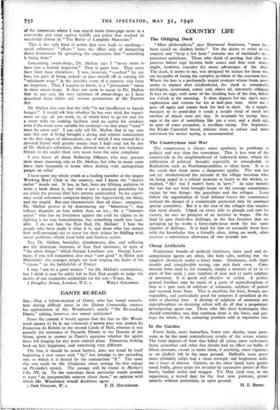The Countryman and War
The countryman is always more apathetic to problems of politics and war than the townsman. This is less true of the countryside in the neighbourhood of industrial areas, where the infiltration of political thought, especially in strongholds of Radicalism such as Northamptonshire, is often keen. It is in the south that there exists a dangerous apathy. The war has not yet revolutionised the attitude of the village batsman who, on being urged in a critical moment to hurry to the wicket, re- marked, " Ah! but I wadn't born in 'urry." In nine months the war has not been brought home to the average countryman except by two things: the parachute and the refugee. Long before the organisation of local defence forces the countryman realised the danger of a countryside protected only by unarmed special constables. But it is the case of the refugee that touches him most closely. Urged on every side to plough and sow for victory, he sees no prospect of an increase in wages. On the land he gets thirty-five shillings; in the flax factories that are springing up he works a forty-eight-hour week for the same number of shillings. It is hard for him to reconcile these facts with the knowledge that a friendly alien, doing no work, often receives a subsistence allowance of two pounds ten.






























 Previous page
Previous page